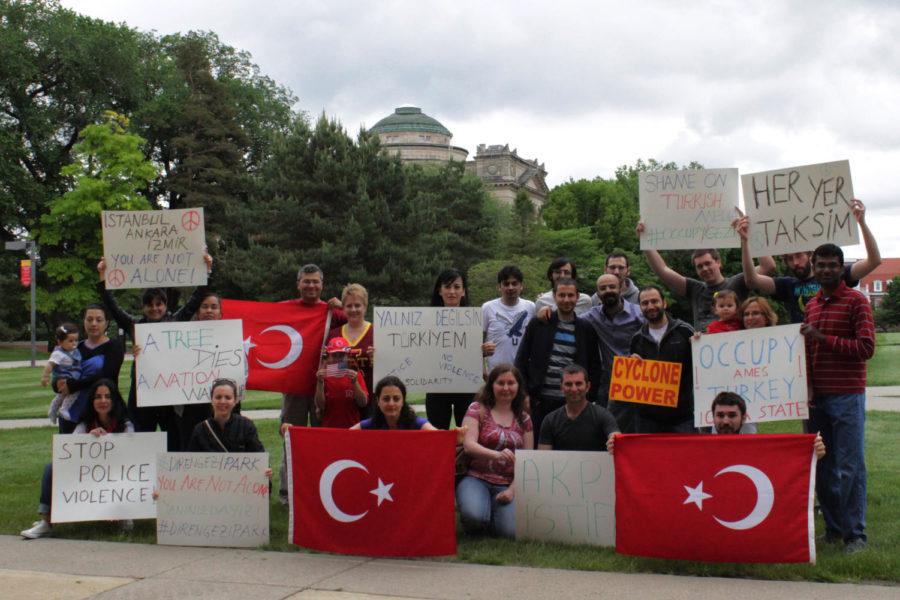Protests in Turkey impact Iowa State students
Photo: Courtesy of Omer Ozgur Capraz.
Turkish protesters gathered outside the Parks Library to promote awareness of conflict arising in Turkey.
June 3, 2013
Protests in Turkey last weekend hit home for about 25 Iowa State students from Turkey.
Tugce Karakulak’s father was gassed by Turkish police during the protests against the Turkish government last weekend. Protests began when plans for putting up a shopping mall on one of the city’s last green spaces were released.
“He just went and washed his eyes out and rested for about an hour and went right back to the protest,” Karakulak said.
Karakulak, a graduate student in materials science and engineering, joined Omer Ozgur Capraz, a graduate student in chemical and biological engineering, Aliye Karabulut, post-doc research associate in engineering-LAS, and approximately 20 other students in a demonstration in front of Parks Library on Saturday afternoon.
“The point was not to protest, there wasn’t even anyone here,” Karabulut said. “We just want people to be aware of what is happening in our country.”
What had started as a relatively small, peaceful protest to protect Gezi Park on Taksim Square in Istanbul City Centre in Istanbul, Turkey, escalated into protestors being tear gassed and water cannoned by police.
It started as a single protest in the park, but after the police started to become violent toward protesters, several towns all around Turkey started to hold protests of their own.
“The protests started to save this park, and now they are for the people to have basic human rights,” Karabulut said.
At 9 p.m. in Turkey, 1 p.m. in the U.S., residents took to the streets with pots and pans, banging them together.
“They want to create a noise. They want to be heard,” Capraz said.
Capraz and Karabulut are both from small towns in Turkey where protesting is much smaller and non-violent compared to the bigger cities. Karakulak’s family is close to Istanbul, where the police gassed her father.
Capraz, Karabulut and Karakulak described the Turkish government as a dictatorship. The protesters started with the message to save Gezi Park, which has been described as one of the last green spaces in Taksim Square. But now, after the police became violent and more than 3,000 people have been hospitalized, screams for Prime Minister Tayyip Erdogan’s resignation are being heard through the streets.
The Turkish government has limited the availability of Internet, and what is being televised, so residents have turned to social media to find out what is going on in their country.
Capraz, Karabulut and Karakulak are helping their friends and family in Turkey via social media sites like Twitter and Facebook.
“We go onto Twitter and see what the police are doing and where they are going,” Capraz said.
“They are also going on Twitter and sharing the best ways to get the gas out of their eyes and what works best,” Karakulak said. “Once the police see them doing that though, they are taking away the items that help them.”
Karakulak was referring to milk and lemons, which victims of tear gas have said help to calm the irritation in their eyes. Karakulak said police will now look for those ingredients and confiscate them if found.
Prime Minister Erdogan arrived in Africa on Monday afternoon and has scheduled visits across the northwestern region of the continent until Thursday, when he is scheduled to arrive back in Turkey.







